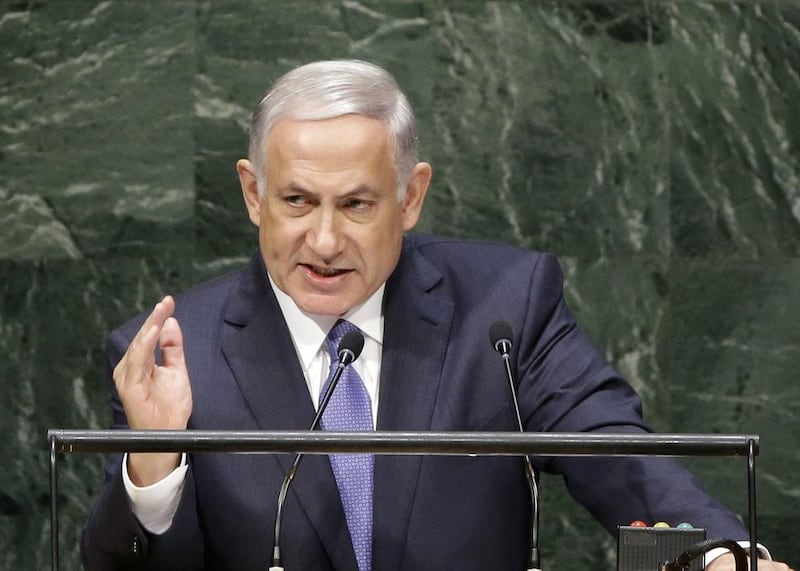NEW YORK // Benjamin Netanyahu said Israel’s war with Gaza was the same as the international fight against ISIL in Iraq and Syria.
Addressing the UN General Assembly on Monday, the Israeli prime minister accused Hamas of committing “the real war crimes” in Gaza by using Palestinian civilians as human shields.
It was an angry response to Palestinian leader Mahmoud Abbas’s speech to the UN last week in which he accused Israel of conducting a “war of genocide” in Gaza.
He attacked world leaders who have condemned Israel for its war with Hamas while praising Barack Obama for attacking ISIL militants and other extremists in Syria and Iraq.
They “evidently don’t understand that ISIS and Hamas are branches of the same poisonous tree”.
However, he reached out to Arab countries, saying that growing “common interests” can help facilitate peace with the Palestinians, but that the road map these countries have supported must be “updated according to current realities”.
“Leading states in the Arab world increasingly recognise that together we and they can lay siege … [to] a nuclear-armed Iran and militant Islamist movements gaining ground in the Sunni world.”
He said that “a broader rapprochement between Israel and the Arab world may help facilitate an Israeli-Palestinian peace”.
Mr Netanyahu made the pitch to Arab countries that are allied with the US in its coalition against ISIL – with the exception of Qatar, which Israel views as backing Hamas – and who also are wary that a nuclear deal with Iran would leave it with the enrichment capacity to build a nuclear weapon in the future.
“To achieve peace we must not only look to Jerusalem and Ramallah, but also to Cairo, Amman, Abu Dhabi, Riyadh and elsewhere,” Mr Netanyahu said.
Without specifying, he implied the peace plan that the Arab League put forward in 2002 “must be updated” to “take into account new realities, new roles and responsibilities for our Arab neighbours”, that would likely include security issues.
A key theme of Mr Netanyahu’s last two General Assembly addresses has been the threat posed by Iran’s nuclear programme, and as the talks deadline draws near Israel is reportedly worried that a final deal could leave Iran with domestic nuclear enrichment capabilities.
The focus on ISIL at this year’s assembly gave Mr Netanyahu an opportunity to try to equate the extremist movement that calls itself the “Islamic State”, with what he called “the Islamic State of Iran”.
“Would you let ISIS enrich uranium? … then you mustn’t let the Islamic state of Iran do those things either,” he said, referring to ISIL’s alternative acronym.
The Israeli premier also likened ISIL to the Nazis, and said that like Hitler, the global threat they pose should not be underestimated.
Mr Netanyahu did not attend the more high-level week of the General Assembly, which his office said was due to the Rosh Hoshana holiday, and was absent during talks between US president Barack Obama with Arab leaders and ministers in the many meetings on the coalition to combat ISIL.
The Israeli premier has repeatedly referenced a “new political horizon” in the region that many see as his desire to engage with Arab countries whose security interests he may see as aligning with Israel’s — Islamist militancy and a wariness of Iran’s nuclear intentions.
This topic will likely be on the agenda during Mr Netanyahu’s brief White House meeting with Mr Obama on Wednesday.
The meeting comes less than two months before the Iran nuclear negotiations deadline, and is the first since the Gaza war, which increased tensions in a bilateral relationship already badly strained by the failure of US-mediated peace talks between Israel and the Palestinian Authority.
In his General Assembly address last week, Mr Obama singled out Israel, saying “too many Israelis [are] ready to abandon the hard work of peace”, and then deviated from his prepared remarks, adding, “and that’s something worthy of reflection within Israel”.
Palestinian president Mahmoud Abbas during his UN speech on Friday asked the Security Council to set a binding timetable to force Israel to negotiate the establishment of a Palestinian state, and he also accused Israel of a “war of genocide” in Gaza and of carrying out war crimes.
tkhan@thenational.ae





